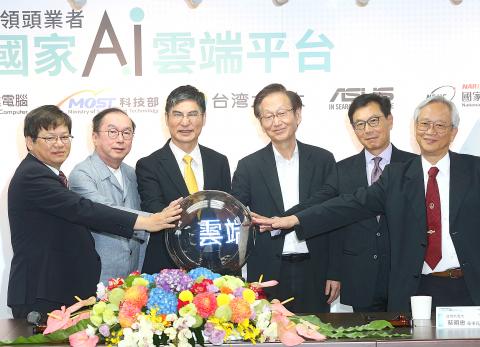Asustek Computer Inc (華碩), Quanta Computer Inc (廣達) and Taiwan Mobile Co (台灣大哥大) yesterday won a NT$1.1 billion (US$36.83 million) government contract to build a cloud-computing platform to boost the development of artificial intelligence (AI).
Organized by the National Center for High-Performance Computing (NCHC), the contract aims to build a national public cloud-computing platform that can deliver supercharged computer power to Taiwanese businesses and academic and research institutions, and incubate homegrown AI applications through improved deep learning and big data analysis capabilities.
The firms won the contract over a rival partnership between Acer Inc (宏碁), Chunghwa Telecom Co (中華電信) and a Japanese partner proposing to use hardware supplied by Hon Hai Precision Industry Co (鴻海精密).

Photo: CNA
As AI becomes increasingly ubiquitous in industrial applications and everyday life, the technology could be the next boom industry in Taiwan, just as PCs were in the past, and neglecting the technology could spell doom for the nation’s economic competitiveness, Minister of Science and Technology Chen Liang-gee (陳良基) said in an address at a ceremony in Taipei.
The government’s Forward-looking Infrastructure Development Program has earmarked a further NT$5 billion for efforts on AI in the next four years, Chen said.
The platform is to use 2,000 Nvidia Corp graphics processing units and its processing power is expected to rank in the top 30 of the world’s fastest supercomputers, Chen said, adding that it is also designed to accommodate continued upgrades to keep up with technological advancements.
Although the contract would not significantly affect the bottom line of the three companies, the platform represents the nation’s first landmark investment in AI, he said.
The three companies, each a leader in their respective fields in the information and communications technology industry, are expected to pool their expertise to build a platform that would have computing power of 7 petaflops, which translates to one quadrillion floating-point operations per second, as well as a storage capacity of 50 petabytes, or approximately 50 million gigabytes.
Quanta would be responsible for the platform’s AI computing and data storage capabilities, while Asustek would be in charge of integrating cloud-based AI services, with Taiwan Mobile to be tasked with building networking infrastructure and security features, the ministry said.
Construction of telecommunications equipment rooms for the AI platform is scheduled to be completed in August, and the cloud host and software are to be installed in September and October respectively, the NCHC said.
The platform could be up and running as early as December and become the nation’s biggest cloud-based hub for AI and deep learning, Chen said.
Many Taiwanese high-tech giants are investing in AI amid fears that any delay could leave them behind the global innovation curve.
Earlier this week, HTC Corp’s (宏達電) healthcare division DeepQ unveiled the DeepQAI platform at Nvidia’s GPU Technology Conference in Taipei, aiming to facilitate the creation of AI healthcare technology.
Some multinational technology firms are also participating in the nation’s AI development, with Google in March unveiling a “Smart Taiwan” program in cooperation with the government, schools and businesses to foster AI talent in the nation.
Additional reporting by CNA

POWERING UP: PSUs for AI servers made up about 50% of Delta’s total server PSU revenue during the first three quarters of last year, the company said Power supply and electronic components maker Delta Electronics Inc (台達電) reported record-high revenue of NT$161.61 billion (US$5.11 billion) for last quarter and said it remains positive about this quarter. Last quarter’s figure was up 7.6 percent from the previous quarter and 41.51 percent higher than a year earlier, and largely in line with Yuanta Securities Investment Consulting Co’s (元大投顧) forecast of NT$160 billion. Delta’s annual revenue last year rose 31.76 percent year-on-year to NT$554.89 billion, also a record high for the company. Its strong performance reflected continued demand for high-performance power solutions and advanced liquid-cooling products used in artificial intelligence (AI) data centers,

SIZE MATTERS: TSMC started phasing out 8-inch wafer production last year, while Samsung is more aggressively retiring 8-inch capacity, TrendForce said Chipmakers are expected to raise prices of 8-inch wafers by up to 20 percent this year on concern over supply constraints as major contract chipmakers Taiwan Semiconductor Manufacturing Co (TSMC, 台積電) and Samsung Electronics Co gradually retire less advanced wafer capacity, TrendForce Corp (集邦科技) said yesterday. It is the first significant across-the-board price hike since a global semiconductor correction in 2023, the Taipei-based market researcher said in a report. Global 8-inch wafer capacity slid 0.3 percent year-on-year last year, although 8-inch wafer prices still hovered at relatively stable levels throughout the year, TrendForce said. The downward trend is expected to continue this year,

Vincent Wei led fellow Singaporean farmers around an empty Malaysian plot, laying out plans for a greenhouse and rows of leafy vegetables. What he pitched was not just space for crops, but a lifeline for growers struggling to make ends meet in a city-state with high prices and little vacant land. The future agriculture hub is part of a joint special economic zone launched last year by the two neighbors, expected to cost US$123 million and produce 10,000 tonnes of fresh produce annually. It is attracting Singaporean farmers with promises of cheaper land, labor and energy just over the border.

US actor Matthew McConaughey has filed recordings of his image and voice with US patent authorities to protect them from unauthorized usage by artificial intelligence (AI) platforms, a representative said earlier this week. Several video clips and audio recordings were registered by the commercial arm of the Just Keep Livin’ Foundation, a non-profit created by the Oscar-winning actor and his wife, Camila, according to the US Patent and Trademark Office database. Many artists are increasingly concerned about the uncontrolled use of their image via generative AI since the rollout of ChatGPT and other AI-powered tools. Several US states have adopted